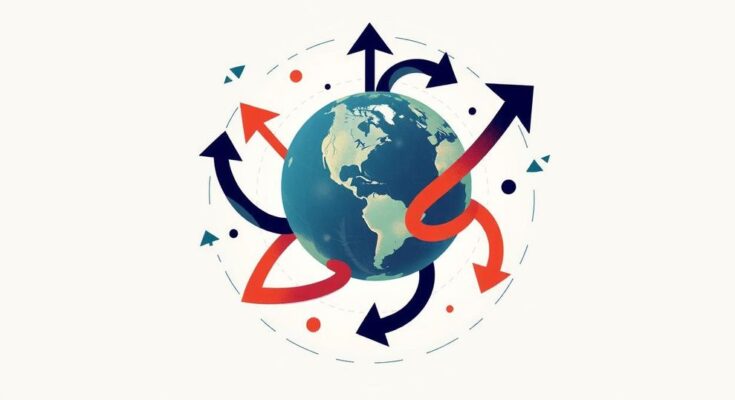Marco Rubio will not attend the G20 summit in South Africa, criticizing the nation’s support for DEI and climate change policies as detrimental. The U.S. has strained relations with South Africa, particularly due to new land expropriation laws affecting white landowners. Trump’s previous remarks and threats regarding U.S. funding further intensify the controversy surrounding this issue.
Secretary of State Marco Rubio has announced his decision to abstain from the upcoming G20 summit in Johannesburg, criticizing South Africa’s commitment to diversity, equity, and inclusion (DEI) as well as its climate change policies, which he described as ‘very bad things.’ In a public statement on X, Rubio expressed disapproval of South Africa’s actions, citing land expropriation practices and the use of the G20 platform to promote what he characterizes as detrimental policies.
The G20 summit is a pivotal event on the diplomatic calendar attended by leaders from the world’s wealthiest nations, making Rubio’s absence particularly notable. Tensions between the United States and South Africa have escalated following former President Donald Trump’s threats regarding funding due to new land expropriation laws instituted in South Africa. The Expropriation Act empowers the state to take land without compensation, disproportionately affecting white landowners.
This legislative measure replaces an older law that mandated compensation for land acquisitions. It remains rooted in the historical context of apartheid, during which a significant majority of farmland in South Africa is controlled by a small percentage of the white population. The South African government has defended the act, arguing that it aligns with international land acquisition standards and the protection of property rights.
Furthermore, Trump has echoed concerns regarding the treatment of specific demographics in South Africa, suggesting a complete cessation of U.S. funding in retaliation. South African President Cyril Ramaphosa has publicly commented on the issue, stating that U.S. contributions are primarily directed toward programs addressing health concerns such as HIV and AIDS, thus reshaping the dialogue surrounding foreign aid.
This emerging dispute recalls similar controversies from Trump’s presidency, including his 2018 remarks regarding violence against farmers in South Africa, which elicited widespread backlash. The current dynamics underscore ongoing tensions and differing perspectives on land reform and property rights within the region.
The current conflict between the United States and South Africa centers on controversial land reform policies, particularly the Expropriation Act, which allows the South African government to seize land without compensation. This law revises older legislation that required compensation for property owners, notably affecting the predominately white landholding demographic. The historical context of apartheid continues to influence perceptions and policies regarding land ownership and racial equity in the nation. Additionally, the broader implications of these policies are magnified by international relations, particularly regarding the G20 summit’s significance as a platform for global dialogue among the wealthiest nations. Relations between the U.S. and South Africa have been further strained by public comments from high-profile politicians, including Trump, leading to heightened scrutiny of South Africa’s internal policies and their socio-political impact.
In summary, Secretary of State Marco Rubio has opted not to participate in the G20 summit in response to South Africa’s policies focused on DEI and climate change. This decision reflects growing tensions between the United States and South Africa, primarily regarding land reform laws that infringe upon property rights. As this situation unfolds, it highlights the complex intersection of international relations and domestic policy reform in South Africa.
Original Source: www.thedailybeast.com




